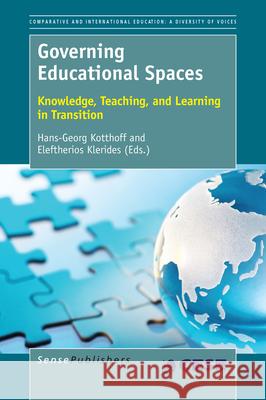Governing Educational Spaces » książka
Governing Educational Spaces
ISBN-13: 9789463002646 / Angielski / Twarda / 2015 / 236 str.
Governing Educational Spaces
ISBN-13: 9789463002646 / Angielski / Twarda / 2015 / 236 str.
(netto: 420,89 VAT: 5%)
Najniższa cena z 30 dni: 423,64
ok. 22 dni roboczych.
Darmowa dostawa!
The governance of education in many countries and regions of the world is currently in transition, challenging histories, remaking subjectivities and shaping possible futures. This book provides an up to date analysis and discussion of the cutting edge theme of educational governance from an international comparative perspective. The volume explores the landscape of 'educational governance' in its broadest sense; considering new forms of steering, leadership and management, assessment and evaluation, teaching and learning, knowledge creation and the realities and possibilities for different forms of political engagement. The new spatial dynamics of education are explored in institutional settings such as schools and universities and via professional groupings such as teachers, administrators and leaders. The chapters in this book are based on the best peer reviewed papers and keynote speeches, which were delivered at the XXVI Conference of the Comparative Education Society in Europe (CESE) in June 2014 in Freiburg, Germany. Comparative Education is uniquely situated to explore the emerging dynamics of educational governance within changing and newly emerging educational spaces because it provides the opportunity to learn more about different local, national or regional educational processes and trajectories and to share knowledge about the logics, ideologies and impacts of different techniques and regimes of governance across Europe and beyond.
The governance of education in many countries and regions of the world is currently in transition, challenging histories, remaking subjectivities and shaping possible futures. This book provides an up to date analysis and discussion of the cutting edge theme of educational governance from an international comparative perspective. The volume explores the landscape of educational governance in its broadest sense; considering new forms of steering, leadership and management, assessment and evaluation, teaching and learning, knowledge creation and the realities and possibilities for different forms of political engagement. The new spatial dynamics of education are explored in institutional settings such as schools and universities and via professional groupings such as teachers, administrators and leaders. The chapters in this book are based on the best peer reviewed papers and keynote speeches, which were delivered at the XXVI Conference of the Comparative Education Society in Europe (CESE) in June 2014 in Freiburg, Germany. Comparative Education is uniquely situated to explore the emerging dynamics of educational governance within changing and newly emerging educational spaces because it provides the opportunity to learn more about different local, national or regional educational processes and trajectories and to share knowledge about the logics, ideologies and impacts of different techniques and regimes of governance across Europe and beyond.











